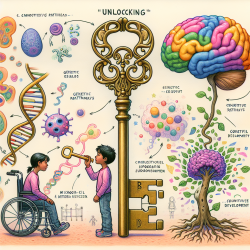Introduction
In the quest to improve outcomes for children with speech and cognitive delays, recent research has shed light on the genetic underpinnings of these challenges. The study titled Pathogenic variants associated with speech/cognitive delay and seizures affect genes with expression biases in excitatory neurons and microglia in developing human cortex offers groundbreaking insights into how genetic variants influence neurodevelopmental disorders.
The Study: A Deep Dive into Genetic Expression
This research integrates phenotypic data from two significant cohorts: 84 neonates from Duke Pediatric Genetics and 4,238 patients from the Deciphering Developmental Disorders (DDD) study. By analyzing single-nucleus RNA-sequencing (snRNAseq) datasets from human cortex samples, the study identifies cell-specific expression biases in genes associated with speech/cognitive delays and seizures.
Key Findings
- Genes linked to speech/cognitive delays and seizures show higher expression in cortical excitatory neurons compared to other genes.
- Distinct expression patterns in microglia were observed, highlighting their role in neurodevelopmental disorders.
- Variants associated with speech/cognitive delay without seizures involve calcium regulatory pathways, whereas those with seizures involve synaptic regulatory machinery.
Implications for Practitioners
Understanding these genetic pathways offers practitioners a roadmap to tailor interventions more effectively. By focusing on the specific neuronal and microglial pathways affected by genetic variants, speech-language pathologists can develop targeted therapies that address the root causes of delays.
Moreover, the study encourages further research into how these genetic expressions can be modulated to improve outcomes. Practitioners are urged to stay informed about genetic testing advancements and consider integrating these insights into their therapeutic strategies.
Conclusion
This research marks a significant step forward in understanding the genetic basis of speech and cognitive delays. By identifying specific gene expression patterns in neurons and microglia, it opens new avenues for targeted therapies and interventions. As we continue to unravel the complexities of neurodevelopmental disorders, the potential to transform children's lives grows ever closer.
To read the original research paper, please follow this link: Pathogenic variants associated with speech/cognitive delay and seizures affect genes with expression biases in excitatory neurons and microglia in developing human cortex.










